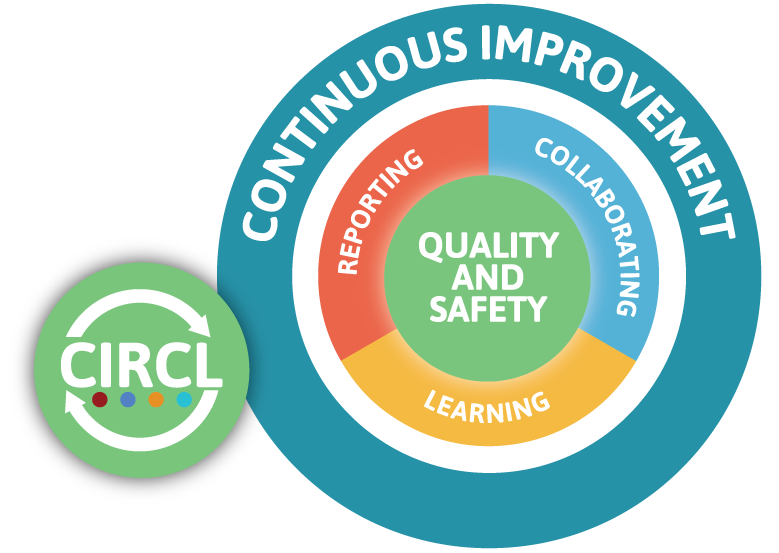
Introducing CIRCL: CPBC's New Medication Incident Reporting Program
CPBC is launching CIRCL (Continuous Improvement, Reporting, Collaborating, and Learning), a comprehensive medication incident reporting program designed to enhance medication safety through structured reporting, analysis, and learning from medication incidents in pharmacies across British Columbia.
A transition period is now underway, with full implementation required by
June 1, 2026.
CIRCL will transform how pharmacy teams approach medication safety by building upon quality management requirements already in place within BC pharmacies while creating a more structured and consistent approach to preventing medication incidents and improving patient care.
| All CIRCL requirements apply to both community and hospital pharmacies with the same timelines and standards. |
The program is supported by amendments to the Pharmacy Operations and Drug Scheduling Act (PODSA) Bylaws and Health Professions Act (HPA) Bylaws, including updates to Schedule A (Code of Ethics), F Part 1 (Community Pharmacy Standards of Practice), Schedule F Part 2 (Hospital Pharmacy Standards of Practice). These amendments have been approved by the CPBC Board.
| The approved bylaws will be published on our website in the coming weeks. |
Medication incidents are a leading cause of injury and avoidable harm in healthcare systems worldwide. In recent years, some of the most common complaints received by CPBC have been related to medication dispensing errors by pharmacy professionals. CIRCL aims to improve pharmacy services by preventing injuries caused by medication incidents through proactive identification of risks, analysis of incidents, and implementation of preventative measures.
Building on National Standards
CIRCL is based on the Model Standards of Practice for Continuous Quality Improvement and Medication Incident Reporting developed by the National Association of Pharmacy Regulatory Authorities (NAPRA), ensuring a consistent approach across Canada while allowing for provincial adaptations. British Columbia joins eight other provinces that have already established mandatory medication incident reporting programs, all aligned with NAPRA standards that form the foundation of CIRCL.
The Elements of CIRCL
CIRCL is built on four foundational elements that work together to enhance quality and medication safety:
Continuous Improvement is a structured process used within a pharmacy that allows for the ongoing review and enhancement of all aspects of care delivery to ensure quality and safety. Instead of only focusing on "What's working?", continuous improvement challenges us to consider "Where can we improve?" It addresses quality concerns when they arise but also prioritizes being proactive in assessing risk and acting before harm can occur.
Reporting creates the foundation for learning by documenting medication incidents and near misses in a standardized way. This documentation is crucial for identifying patterns, understanding contributing factors, and developing effective preventative measures.
Collaborating brings together pharmacy team members, patients, other healthcare providers, and pharmacy regulators across Canada to create safer pharmacy care through shared understanding and collective action.
Learning transforms individual incidents into opportunities for systemic improvement. It moves beyond simply addressing the immediate problem to understanding underlying causes and implementing meaningful changes to prevent harm.
What This Means for Your Pharmacy
CIRCL provides a structured approach to quality improvement that can help your pharmacy identify and address risks before incidents occur, learn from incidents in a systematic way, enhance team collaboration and engagement, improve patient trust and satisfaction, and create a safer practice environment for both patients and staff.
What pharmacy teams need to do:
- Reporting Platform Implementation: By June 1, 2026, each pharmacy must have access to a reporting platform that supports mandatory data fields, de-identifies data, integrates with national databases (National Incident Data Repository (NIDR) for community pharmacies, National System for Incident Reporting (NSIR) for hospital pharmacies). Several platforms are available to meet these requirements.
- Team Meetings: An initial team meeting must be held before June 1, 2027, with subsequent meetings at least annually to review incidents, discuss contributing factors, and develop improvement plans.
- Safety Self-Assessments: Initial assessments must be completed before June 1, 2027, with subsequent assessments at least every three years using appropriate software tools.
- Incident Documentation: All medication incidents must be documented with specific required information including date, type of incident, who discovered it, medication system stages involved, medications involved, degree of harm, incident description, and contributing factors.
CIRCL embodies a culture of safety and just culture, focusing on system-wide learning rather than individual blame. Data submitted to national databases is de-identified, and CPBC will only have access to aggregate data to identify opportunities for provincial safety improvements.
Getting Ready for CIRCL
CPBC is developing comprehensive resources to support pharmacies and pharmacy professionals through the CIRCL implementation, including a General CIRCL Guide, Reporting Platform Quick Start Guide, and role-specific implementation guides. These resources will be released progressively during the transition period.
For more information about CIRCL, visit our website, which includes detailed information about each of the four pillars, program requirements, incident handling procedures, platform selection guidance, and team meeting requirements. Also, keep an eye on your inbox and future communications for more guidance to support you and your team through this transition.
| Learn more at: bcpharmacists.org/CIRCL |



